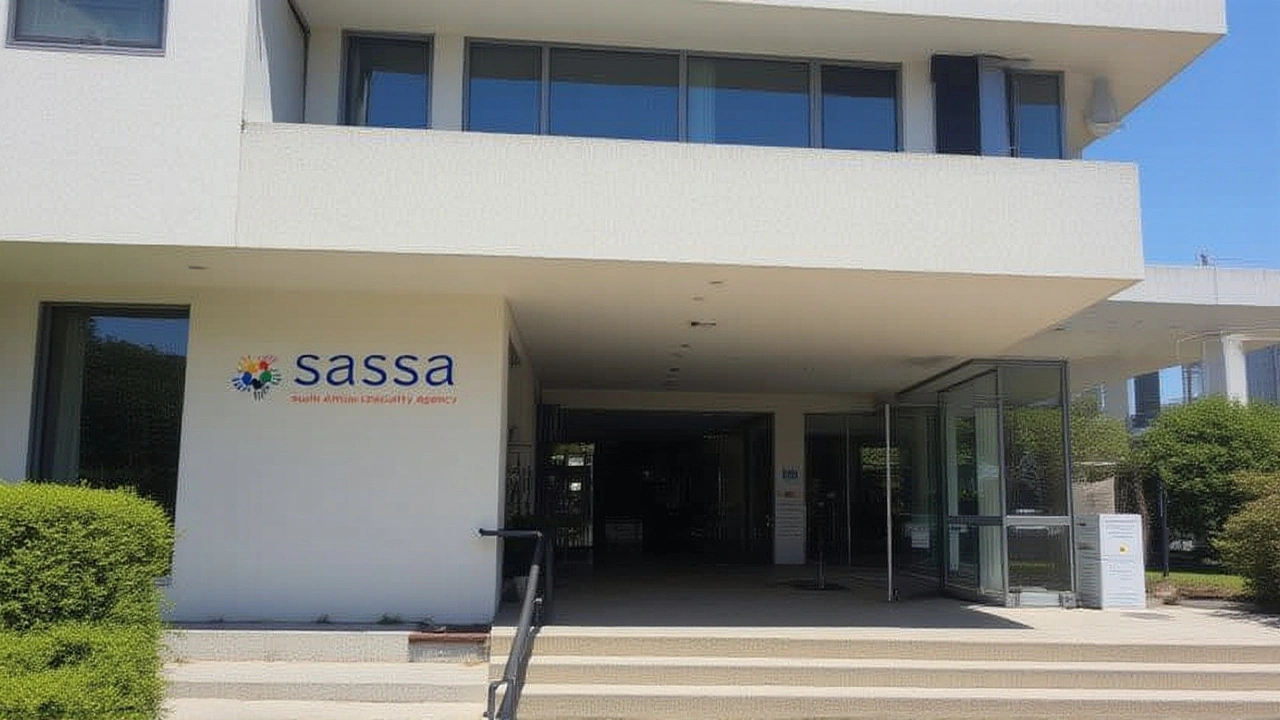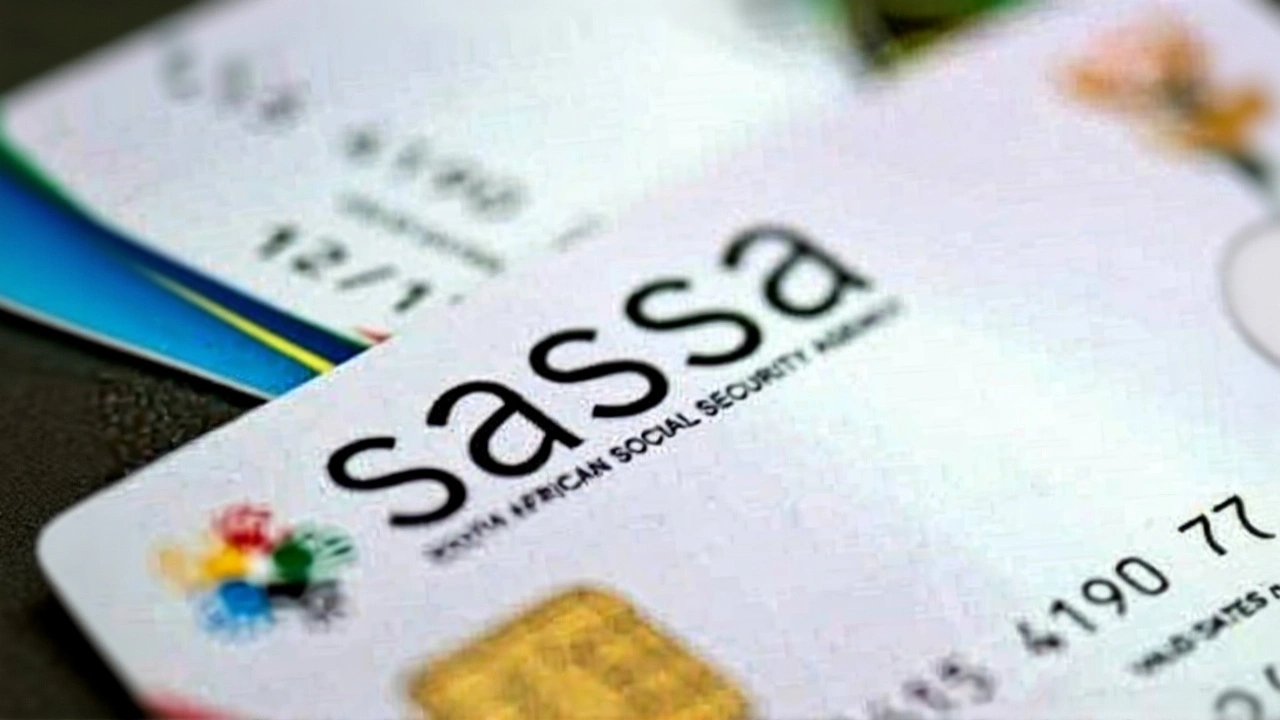SASSA Sets August 2025 Grant Dates, Urges Beneficiaries to Update Details

When SASSA announced the August 2025 social grant payment cycle, millions of South Africans braced for the month’s cash flow. The schedule, unveiled in a series of statements on 20‑21 July 2025, set a staggered rollout that began on Tuesday, 5 August, with the Older Persons grant, followed by Disability and Children’s grants on the next two days. Lindiwe Zulu, the Minister of Social Development, stressed that keeping personal details up‑to‑date was the quickest way to avoid hiccups at the collection points.
Why the staggered schedule matters
The staggered system isn’t new, but this month’s rollout came after a surge in complaints about queues at South African Post Office branches and retail outlets. By spreading out the payout days, SASSA aims to keep lines moving and reduce the risk of COVID‑19‑related crowding, even though the pandemic is largely under control. The approach also eases the load on ATMs that dispense the R2 315‑plus grants, especially in rural areas where cash machines are few and far between.
Breakdown of August 2025 grant amounts
- Old Age Grant (ages 60‑74): R2,315
- Old Age Grant (75+): R2,335
- Disability Grant: R2,315
- War Veterans and Care Dependency Grants: R2,315 each
- Child Support Grant: R560
- Foster Care Grant: R1,250
- Social Relief of Distress (SRD) Grant: R370
These figures mirror the amounts set for the previous month, meaning SASSA has not altered the monetary value despite inflation pressures. Over 17 million South Africans rely on these payouts, translating to roughly R43 billion flowing through the system each month.
Communication blitz and the push for accurate data
SASSA’s outreach this year was arguably its most aggressive. In addition to the July press releases, the agency flooded radio stations, sent SMS alerts, and posted bilingual notices on its website. A spokesperson, Thabo Mthembu, told reporters that “any mismatch between a beneficiary’s records and the national database can trigger a temporary hold, which is why we’re urging people to verify their phone numbers, bank details, and ID documents right now.”
The call to action is especially urgent for the roughly 210 000 recipients whose earnings now exceed the income thresholds set for means‑tested grants. SASSA warned that failure to report increased earnings could be classified as fraud, carrying penalties up to R200 000.
Compliance, verification and the 210 000‑person challenge
Under the Department of Social Development, a verification task team has been formed to audit high‑income claimants. The team uses data‑matching software that cross‑checks tax records, utility bills, and banking activity. “We’re not looking to punish honest people,” said Minister Zulu in a televised interview on 2 August. “We just need to make sure the safety net reaches those who truly need it.”
To facilitate voluntary compliance, SASSA opened a dedicated hotline (0800 123 456) and a simple online portal where recipients can upload payslips or tax certificates. Early indicators suggest that about 35 % of the targeted group have already reported changes.
Impact on beneficiaries across the provinces
From Cape Town to Polokwane, the rollout was felt differently. In the Eastern Cape, where many beneficiaries travel long distances to the nearest post office, the staggered dates meant fewer people on the road at once. “I usually wait three hours on a Monday,” said Nomsa Dlamini, a retiree from Grahamstown. “This week I went on Thursday and the line was half the size.”
Conversely, in Gauteng’s densely populated townships, the influx of younger families collecting Child Support grants still produced notable queues. Local NGOs have stepped in, offering transport vouchers on the day the children’s grant is released.
What’s next? Looking ahead to September and beyond
SASSA says the September schedule will follow the same pattern, but with a new pilot: digital payouts directly to bank accounts for beneficiaries who opt in. The pilot, slated for 12 September, will test whether electronic transfers can further de‑congest collection points.
Meanwhile, the agency is reviewing the grant amounts in light of the Consumer Price Index, which rose 5.3 % year‑on‑year in August. “A review is on the agenda for the first quarter of 2026,” Minister Zulu hinted, “but any decision will balance fiscal sustainability with the realities on the ground.”
Key facts at a glance
- Payment dates: Older Persons – 5 Aug; Disability – 6 Aug; Children’s – 7 Aug 2025.
- Total monthly outflow: ~R43 billion.
- Beneficiaries urged to update details via hotline or online portal.
- ~210 000 high‑income recipients asked to report earnings.
- Digital payout pilot launching 12 Sept 2025.

Frequently Asked Questions
How can beneficiaries update their personal details?
Beneficiaries can call the SASSA hotline at 0800 123 456, visit any SASSA office, or log into the online portal on the agency’s website. Required documents include a valid ID, recent proof of address, and banking information if they wish to receive payouts electronically.
What happens if a grant recipient earns above the income threshold?
Those recipients must report the change within 30 days. Failure to do so can lead to a temporary suspension of the grant and, in cases of deliberate non‑disclosure, possible fines up to R200 000 or criminal prosecution.
Can I collect my grant before the official payment date?
SASSA states that once the scheduled date passes, beneficiaries may collect their money at any time. However, funds are not released before the announced date, so early collection is not possible.
What safety measures are in place at collection points?
Post offices and retail outlets follow strict crowd‑control protocols: marked queuing areas, regular sanitisation, and staff equipped with personal protective equipment. SASSA also encourages the use of mobile money agents to reduce foot traffic.
When will the digital payout pilot begin?
The pilot is scheduled for 12 September 2025 and will involve a select group of beneficiaries who have confirmed bank details. Participants will receive their grants directly into their accounts, bypassing cash collection points.
Wow... SASSA finally got their act together??, but... the whole staggered thing? It looks like they’re just trying to hide the fact that they can’t keep up, lol!! , people need to update their deets ASAP – otherwise… you’ll be stuck in line forever??.
Indeed, the logistical choreography portrayed by SASSA resembles a symphonic overture of bureaucracy-resplendent yet riddled with inefficiencies. While the intent to de‑congest queues is commendable, the execution could benefit from a more pellucid communication strategy.
The staggered dates reduce crowding. Beneficiaries should check the portal early.
Absolutely, staying ahead of the schedule saves everyone time and stress. Just pop onto the site, upload your latest payslip, and you’ll be good to go.
Let me break down why this whole SASSA rollout is more than just a bureaucratic shuffle. First, the staggered schedule is a textbook example of a controlled release, designed to mask cash flow constraints that the department is unwilling to admit publicly. Second, the push for data updates coincides eerily with a recent uptick in digital banking contracts being pushed by major private banks-clearly an orchestrated move to siphon off state funds into the private sector. Third, the alleged “COVID‑19 crowd control” rationale is laughably outdated; most regions have lifted restrictions months ago, yet the narrative persists. Fourth, the enforcement of income thresholds on 210,000 high‑earners is a thinly veiled attempt to cleanse the registry of any politically connected beneficiaries who might be wielding undue influence. Fifth, the hotline number 0800 123 456 has been reported to be constantly busy, suggesting a bottleneck deliberately created to discourage compliance. Sixth, the online portal’s user interface is riddled with glitches, a classic tactic to push people back to in‑person offices where they can be monitored. Seventh, the mention of a digital payout pilot in September is suspiciously timed before the fiscal year ends, hinting at an upcoming audit that could be leveraged for political leverage. Eighth, the SASSA spokesperson’s comments about “not punishing honest people” betray an underlying distrust of the grant recipients, reinforcing a paternalistic stance. Ninth, the fact that the grant amounts have remained static despite a 5.3 % CPI increase signals fiscal pressure that the government is trying to hide from the electorate. Tenth, the reliance on post offices and retail outlets for cash distribution is a legacy system that benefits a network of private contractors with vested interests. Eleventh, the regional disparities in queue lengths reveal that the rollout plan was not uniformly applied, benefiting urban areas over rural communities. Twelfth, the communication blitz via radio and SMS may appear comprehensive, but it overlooks the digital divide that leaves many beneficiaries uninformed. Thirteenth, the audit team’s data‑matching software pulling tax records and utility bills raises privacy concerns that have not been addressed. Fourteenth, the surrounding media coverage has largely echoed SASSA’s narrative without critical investigation, suggesting a coordinated PR effort. Fifteenth, the upcoming review of grant amounts in early 2026 is positioned as a “balanced” decision, yet historically such reviews have resulted in cuts rather than increases. Finally, citizens should remain vigilant, verify any requests for personal data, and consider the broader political implications of these administrative changes.
Brothers and sisters, while the technocratic babble of the previous comment spins webs of distrust, let us remember that the soul of our nation lies in the solidarity of its people. The grant system, despite its flaws, is a manifestation of our collective responsibility to uplift the vulnerable. It is not a foreign plot but a homegrown effort, albeit marred by inefficiencies that we, as citizens, must demand to be rectified. When we speak of data updates, we must also demand that the government safeguards our identities against any external exploitation. The push for digital payouts must be accompanied by robust local infrastructure, not outsourced to multinational banks that siphon wealth away from our communities. In short, we must support the system while holding it accountable, ensuring that every R2,315 reaches a South African who truly needs it.
Hey folks, just wanted to say the new dates look good overall. If you update your info early you’ll avoid the usual hassle at the post office. Good luck!
Totally agree 😊 Updating early saves a ton of time. Let’s all get it done and keep the lines short! 👍
Check the portal now, it’s quick.
Yo, the site is kinda glitchy but if u click the right link u’ll sort it out, no big deal.
Sure, because scrolling through endless forms is exactly how I wanted to spend my Saturday.
While one may perceive the procedural requirements as onerous, they are, in fact, indispensable safeguards designed to preserve the integrity of the social assistance framework. It is incumbent upon each beneficiary to fulfill these obligations with due diligence.
Honestly, the whole SASSA drama feels like a reheated soap opera; they announce dates, then the plot thickens with last‑minute glitches, and we, the audience, are left waiting for the next episode.
Perhaps the real lesson here is that patience, like a river, carves its path through bureaucracy, shaping both the system and its people.
The emotional toll of waiting in lines cannot be overstated; each minute spent in a crowded post office chips away at the wellbeing of already vulnerable individuals, reinforcing the urgent need for efficient digital alternatives.
It’s clear that faster digital payments would reduce stress for many.